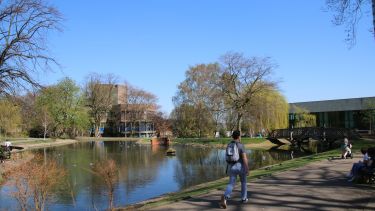About the department
Rated 'excellent' in the last Teaching Quality Assessment, the Department of Geography has an internationally-recognised record of academic research.

Geography at Sheffield is ranked within the top 10 Geography departments in the world (Global Ranking of Academic Subjects (GRAS) by ShanghaiRanking 2021). 100% of our research impact work is rated in the highest two categories in the REF 2021, meaning it is classed as world-leading or internationally excellent.
Jump to: History of the Department
The department is housed in an award-winning, purpose-built building on the edge of Weston Park, lying close to the University Library, the Union of Students and central lecture theatres.
We have a well-equipped computer teaching laboratory, postgraduate and undergraduate physical geography laboratories, and image processing facilities which provide an important component for teaching and research in remote sensing and geographical information systems (GIS).
We have over 30 full-time academic staff in the department, including 12 professors. Staff numbers are equally divided between human and physical geography and our research and teaching strengths range across the discipline.
The department has three general aims, consistent with those of the University as a whole:
To provide quality teaching at undergraduate and postgraduate levels, informed and invigorated by the research and scholarship of academic staff.
To provide access to the widest possible range of sources of knowledge, and the resources to enable the pursuit of learning and scholarship.
To provide an environment in which all members of the department can enhance their skills and apply them to a wide range of theoretical and practical problems in the service of the wider community.
History of the department
We are one of the oldest geography departments in the country - in 2017 we celebrated our 110th year.
The University of Sheffield received its Royal Charter in 1905, and the Department of Geography was created not long afterwards.
At a meeting of the University's Court in 1907, the President of the Royal Geographical Society, Sir George Goldie, gave an inspirational speech to the room, which included William Edgar Allen, the Chairman of Edgar Allen & Co Steel Works. Compelled by Goldie's speech, Edgar Allen offered £150 a year for five years to introduce the teaching of geography to the University.
In the early years, the geography department was located in Western Bank and was small, with one lecturer - even by 1914 it had only 15, predominantly locally based, students. The First World War saw reduced student numbers apart from a ‘special course’ related to the war effort, for which 41 students enrolled; probably studying map reading and surveying. Post-war student numbers soared, reaching 50 in 1919. In 1923, Sheffield University was contracted to train staff for the new London and North Eastern Railway company and Rudmose Brown taught ‘Railway Geography’ to 133 students. After 16 years with only one staff member, 1924 saw the arrival of Alice Garnett as an Assistant Lecturer and the establishment of a BSc degree in Geography. A BA degree in Geography followed in 1928.
Alice Garnett’s enduring legacy to her department was her lobbying for a purpose-built building for geography, where the geography annexe had been on Winter Street. The building which geography still occupies was opened in 1970 by the then head of department, Ron Waters. Terraced houses on Winter Street were demolished for the new geography building which was integrated into Weston Park. This and other features - including the hexagonal teaching rooms - earned the building a Civic Trust commendation.
The building contained a library, a map library, a physical research laboratory with a huge flume, an aerial photograph analysis room and teaching rooms sufficient for all but the biggest first and second-year lectures. It also had offices for academic staff, tutorial rooms, a workshop, photographic and cartographic suites.
We are now one of the largest geography departments in the UK, with a diverse student body and research that is not only international but world-leading.

International Merit Scholarships
We offer a generous package of financial support for international students including 75 undergraduate scholarships worth £10,000 towards the annual tuition fee and 125 postgraduate taught scholarships worth £5,000 towards the tuition fee. Applications are now open for existing offer holders.
